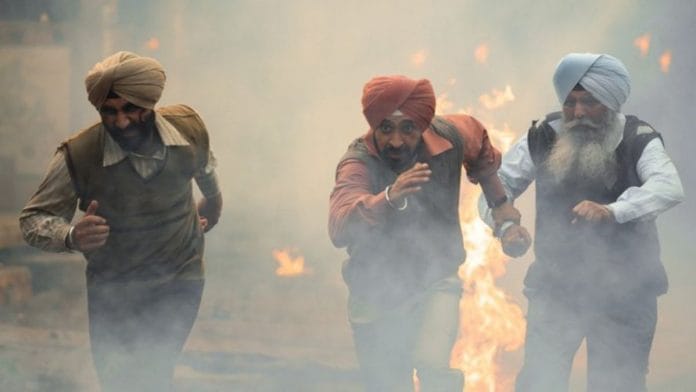Netflix’s Jogi is a fictional drama set during the 1984 anti-Sikh riots in Delhi. Directed by Ali Abbas Zafar of Tiger Zinda Hai and Gunday fame and co-written with Sukhmani Sadana, it is a dramatisation of the horror that unfolded after the assassination of then Prime Minister Indira Gandhi in October 1984. This harrowing tale is told through the lens of its protagonist Jogi, played by Diljit Dosanjh.
As Delhi turns on its Sikh residents, Delhi Jal Board employee Joginder Singh aka Jogi, a resident of Gali Number 6, Block 32, Trilokpuri, East Delhi, decides to put up a fight to help save everyone he can from the quagmire of violence that engulfs the city in just a few hours.
Jogi takes the help of Rawinder Chautala, a Haryanvi policeman played by Mohammed Zeeshan Ayyub and a Muslim truck owner, Kaleem, played by Paresh Pahuja, to secretly transport all the surviving residents of his Trilokpuri lane to Punjab’s Mohali. They are up against Trilokpuri municipal councillor Tajpal Arora—played by veteran actor Kumud Mishra— who is hell-bent on wiping out every single Sikh from the capital by getting criminals to unleash horror.
Also read: Maharani 2 sees Rani Bharti go from political pawn to queen bee. Watch it for Huma Qureshi
A Diljit Dosanjh show
Jogi is a Diljit Dosanjh film through and through. The singer-actor is brilliant in his depiction of a happy-go-lucky middle-class man who displays immense bravado when the time comes.
Diljit gives an earnest performance as the common man determined to save whoever he can. The confusion at the deep hatred spilling over in Delhi, the pain of losing his loved ones, and the courage to not save him and his family alone, is blended well through every aspect of his performance. The film rests squarely on his able shoulders.
Zeeshan Ayyub is perfect in his role as the man resisting Arora’s diktats while trying to help Jogi and other Sikhs of his lane escape. Pahuja, too, holds his own and is convincing as an equally marginal figure—a Muslim—who unquestioningly helps Jogi.
Kumud Mishra seems to get better with every role he plays. He is a class apart as the menacing, purely hate-fuelled councillor who is keen to complete the ‘mission’ entrusted to him by an anonymous ‘top brass.’ There are moments when his evil seems larger-than-life, but it is more the writing than Mishra’s acting at fault in those instances.
Hiten Tejwani is a revelation as the man who only has his eyes on Jogi. The reason for his unadulterated hatred of Jogi is revealed later in the film and steers the movie to its eventual conclusion.
Also read: Glitz, glamour, ‘first-world’ problems—Fabulous Lives of Bollywood Wives is a guilty pleasure
The ghost of 1984
One of the scenes in Jogi plays out like a part of Amitav Ghosh’s short story, The Ghosts of Mrs Gandhi. Jogi is confronted with a harsh, unforgiving reality when he boards a bus to ITO with his father. Men on the bus refuse to let them sit, hit them and throw them out. They reach home only to find their beloved gali up in flames.
Friends and family have been brutally murdered and from Trilokpuri to Geeta Colony, everyone has turned on the Sikhs. The horrific atmosphere created for this film keeps one engaged. With the memory of the 2020 North East Delhi riots still afresh, this look at a shameful point in Delhi’s history is handled well by Zafar.
The evacuation drama is peppered with several well-executed moments. Viewers find themselves on the edge of their seats when a turbanless Jogi drives a truck full of Sikhs. It is also endearing to see Rawinder protect them with his police jeep in a Hindu-dominated area.
The film is mostly crisp, with no unnecessary garnishing. But the ending does not quite land as it veers into a typical, high-octane Zafar film. For any imagined crisis and rescue situation, his melodramatic ending would have worked. But with such a sensitive subject and period in history, it feels jaded and out of place. While Jogi has its flaws and could have done better, Diljit Dosanjh ensures it remains a must-watch on OTT this week.
(Edited by Zoya Bhatti)






